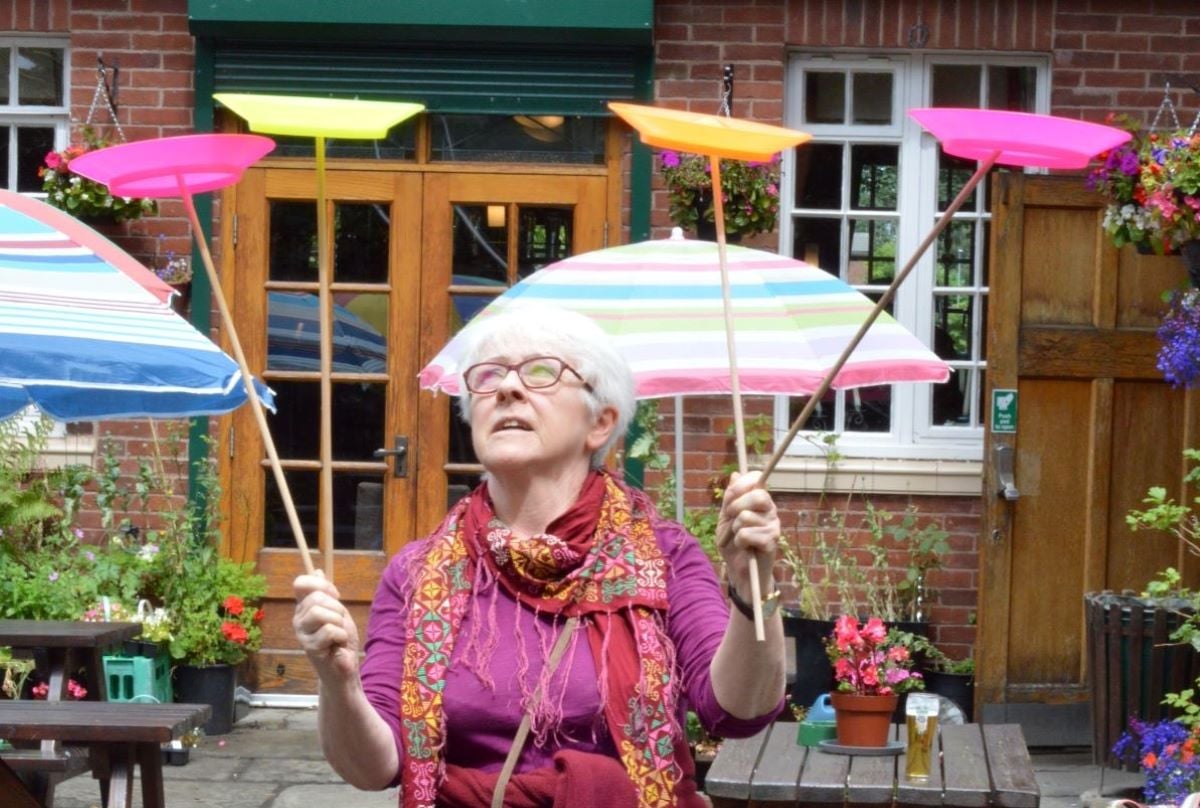
Plate spinning, The Circus House
Photo: Jessica Stewart
Forging new opportunities in creative health
As part of National Creative Health and Wellbeing Week, Julie McCarthy explores the challenges and opportunities for Greater Manchester in its ambition to become the world’s first creative health city region.
During the pandemic, I worked with one of the most respected creative health thinkers and doers, Dr Clive Parkinson to publish A Social Glue. This wasn’t your typical report or think-piece: it was a polemic and a call to action, born of the challenges that surrounded us and inspired by the immense opportunity and energy we sensed around creative health.
A Social Glue rightly spotlighted Greater Manchester as a creative health vanguard, but it also set out to challenge local cultural, health and social care leaders to go further and make a bold commitment to recognising culture and creativity as integral to the health and wellbeing of our 2.8 million residents.
Fast forward to May this year and the NHS in Greater Manchester now has a Creative Health Strategy and an Integrated Care Partnership Strategy. Both cite the arts and culture as key tools in the effort to narrow health and wellbeing disparities across the city region. We’re now co-designing a set of delivery plans alongside commissioners, clinicians, local authorities, the voluntary sector and, of course, the cultural sector.
Systemic barriers
Our first steps have been to map the creative health practice that’s already happening. We’ve documented the work of cultural sector organisations as well as previously hidden activity taking place in faith organisations, local community centres and as part of social prescribing programmes.
We’re also engaging with cultural organisations and freelance creative practitioners to understand their training and support needs. By talking to people right across health and social care about their experiences, we’re beginning to understand some of the systemic barriers that prevent creative approaches from taking root.
By establishing strategic partnerships with health education providers, we’re exploring how existing health sector training might be made available to creative health practitioners. And our work with social prescribing delivery organisations will enable us to make creative health opportunities available, and more sustainable, in, with and for communities too.
A key challenge for Greater Manchester is addressing the social determinants of health as highlighted in the Marmot Reviews of 2010 and 2020. These are the non-medical factors influencing our health and include things like socioeconomic status, education, employment, gender and ethnicity. Culture has hardly figured in the conversation about social determinants of health until now. I feel we need to shout louder about the potential of culture to contribute to a radical vision of public sector reform and of health equity, with communities placed right at the heart.
That’s why our creative health strategy not only focuses on how creative practice can support people with Long Covid, young people struggling with their mental health or older people with dementia, but also proposes a clear vision for creative health as a driver for a new person-centred and community approach to health.
Building on what’s right
My own work in creative health began as a volunteer on a drama project in a high security prison in Brazil. There I had a moment of realisation about how vital culture and creativity was to the lives of everyone, whoever and wherever they may be. This belief in the fundamental right to creative expression and access to health and care is reflected in the structure of our strategy, which focuses on the whole life course and takes an asset-based approach that builds on what’s right with someone rather than what is ‘wrong’ with them.
Around us, new national infrastructures are taking shape; the Culture, Health and Wellbeing Alliance has become an Arts Council England National Portfolio Organisation and the National Centre for Creative Health is leading a comprehensive review into creative health.
The National Academy for Social Prescribing continues to support creative health practice and was recently award significant investment to continue this work. These allies and partners, alongside creative health specialists based in Greater Manchester such as Arc, START, 42nd Street, Made by Mortals and others are part of a movement for systemic, city-region change.
The need for allies
We’re riding what feels like a once in a lifetime wave of energy, enthusiasm and opportunity for creative health in Greater Manchester. What we cannot do is allow this excitement to distract us from our ultimate policy goal: to reduce health inequity (the unfair and avoidable differences in health among certain groups) and support people to live happier and healthier lives, whatever their postcode.
I can’t pretend it is easy. Despite the many wide-open doors, questions about commissioning, evidence, training, practitioner support and, of course, funding are issues we are working through in our delivery plan. We can’t solve these alone.
We have found powerful allies across health, social care and local government; we have established a research partnership with the University of Manchester and, together working with policy experts Culture Commons, we are working to develop new partnerships both nationally and internationally.
Culture and health are human rights. I feel privileged to be spearheading creative health in Greater Manchester and to be making dynamic and joyful connections with colleagues here and further afield. Please do join us.
Julie McCarthy is Strategic Lead for Creative Health at NHS Greater Manchester Integrated Care.
![]() @artymccarthy |@GMPandC
@artymccarthy |@GMPandC
As part of National Creative Health and Wellbeing Week 2023, on 18 May Julie McCarthy will be in conversation with Paul Lynch, Director of Strategy and Planning at Greater Manchester NHS Integrated Care, to explore establishing Greater Manchester as the first creative health city region. Tickets are available here.
Join the Discussion
You must be logged in to post a comment.